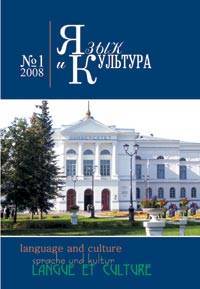The system of culture-based approaches to foreign language teaching
The problem of integration of cultural in the system of a foreign language teaching has been one of the cornerstones in the methodology of foreign language teaching since the end of the twentieth century to the present day. For several decades, both in Russia and abroad, a lot of information has been accumulated on the status and role of culture in language education sphere, demonstrating the progressive development of a culturally significant ideology, the emergence and adoption of a holistic, culturally appropriate linguodidactic para-digm.Today the concept of teaching language and culture in their closest inseparable connection is universally recognized. This has found its embodiment both in regulatory educational instructionsas well as in a variety of scientific concepts that seek to identify specific vectors of interaction between language and culture in the process of foreign language education. As a consequence of the special interest in this problem various approaches have emerged, aimed at substantiating linguodidactic strategies, which are based on interaction in the educational process of language and culture.Nowadays we have accumulated information about a large number of culture-based approaches. In Russian lingvodidactics there are such approaches ascountry studies, linguoregional, linguocultural, sociocultural, sociolinguistic, multicultural, and intercultural studies. Abroad, such approaches as functional-semantic, cultural-sensory, transcultural, ethnographic are explored.The available information was not systematized with revealing of differentiating features separating one didactic direction from another. There is a need to systematize culture-based approaches: to identify integral and differentiating features. The article suggests a description of culture-based approaches, an attempt is made to establish taxonomic relations between them, conclusions are drawn summarizing the disparate information about the essence, features and purpose of approaches that didactically integrate language and culture.
Keywords
язык и культура,
культуросообразные подходы,
система,
лингводидактическая стратегия,
этноцентризм,
поликультурность,
language and culture,
culture-based approaches,
system,
linguodidactic strategy,
ethnocentrism,
multiculturalismAuthors
| Tareva E. G. | Moscow City University | elenatareva@mail.ru |
Всего: 1
References
Пассов Е.И. Методика как теория и технология иноязычного образования. Елец : ЕГУ им. И.А. Бунина, 2010. Кн. 1. 543 с.
Бондаревская Е.В. Педагогика: личность в гуманистических теориях и системах воспитания. М. ; Ростов н/Д, 1999. 560 с.
Верещагин Е.М., Костомаров В.Г. Язык и культура: лингвострановедение в препо давании русского языка как иностранного. 4-е изд., перераб. и доп. М. : Рус. яз., 1990. 246 с.
Бердичевский А.Л., Гиниатуллин И.А., Лысакова И.П., Пассов Е.И. Методика межкультурного образования средствами русского языка как иностранного. М. : Рус. яз. Курсы, 2011. 184 с.
Воробьев В.В. Лингвокультурология. М. : Изд-во Рос. ун-та дружбы народов, 2008. 336 с.
Красных В.В. Этнопсихолингвистика и лингвокультурология. М. : Гнозис, 2002. 181 с.
Сафонова В.В. Изучение языков международного общения в контексте диалога культур и цивилизаций. Воронеж : Истоки, 1996. 237 с.
Сафонова В.В. Межкультурный диалог; методический вызов, проблемы и перспективы развития в языковой педагогике // Языки в современном мире : материалы Х Междунар. конф. / отв. ред. Л.В. Полубиченко. М. : КДУ, 2012. С. 48-59.
Сафонова В. В. Культуроведческий ракурс современного языкового образования // Ученые записки национального общества прикладной лингвистики. 2013. № 2 (2). С. 26-46.
Сысоев П.В. Языковое поликультурное образование в XXI веке // Язык и культура. 2009. № 2 (6). С. 96-110.
Тарева Е.Г. Межкультурный подход к подготовке современных лингвистов // Язык. Культура. Коммуникация. Н. Новгород, 2011. С. 237-244.
Тарева Е.Г. Эволюция лингводидактики: от классического к постнеклассическому измерению // Магия ИННО: новое в исследовании языка и методике его преподавания : материалы второй науч.-практ. конф. / отв. ред. Д.А. Крячков. 2015. С. 239244.
Жукова И.Н., Лебедько М.Г., Прошина З.Г., Юзефович Н.Г. Словарь терминов межкультурной коммуникации / под ред. М.Г. Лебедько, З.Г. Прошиной. М. : Флинта: Наука, 2013. 632 с.
Kramsch C. The cultural component of language teaching // Multiculturalism and language learning. Language, Culture and Curriculum. Special issue. 1995. № 8 (2). P. 8392.
Meyer M. Developing transcultural competence: Case studies of advanced language learners // Madiating Languages and Cultures: Towards an Intercultural Theory of Fore-ing Language Education. Clevedon : Multilingual Matters, 1991. P. 136-158.
Neike W. Interkulturelle Erziehung und Bildung. Weltorientierung im Alltag. Opladen Leske + Budrich, 2000. 260 p.
Byram M., Zarate G. The Sociocultural and Intercultural Dimension of Language Learning and Teaching. Strasbourg : Council of Europe, Council for Cultural Cooperation, 1997. 120 p.
Boyer H. Nouvelle introduction a la didactique du franjais langue etrangere. Paris : CLE International, 1990. 240 p.
Corbett J. An Intercultural Approach to English Language Teaching (Language for Inter-caultural Communication and Education). Clevedon, Philadelphia, Adelaide : Multilingual Matters Ltd., 2003. 216 p.
Kaikkonen P. Interkulturelles Lernen in einem multikulturellen Europa - Fremdsprachli-ches lernen im Spannungsfeld // Europakompetenz - durch Begegnung lernen / hrsg. von A.H. Hilligus, M.A. Kreienbaum. Verlag Barbara Budrich, Opladen & Farmington Hills, 2007. P. 35-64.
Tareva E. G., Shchepilova A V., Tarev B. V. Intercultural Content of a Foreing Language Texbooks: Consept, Texts, Practices // XLinguae. 2017. Vol. 10, № 3. P. 246-255. DOI: 10.18355/XL.2017.10.03.20

